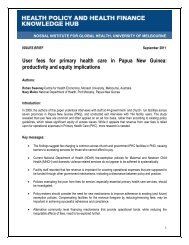AN INTRODUCTION TO MENTAL HEALTH - The Nossal Institute for ...
AN INTRODUCTION TO MENTAL HEALTH - The Nossal Institute for ...
AN INTRODUCTION TO MENTAL HEALTH - The Nossal Institute for ...
Create successful ePaper yourself
Turn your PDF publications into a flip-book with our unique Google optimized e-Paper software.
•<br />
If the person is thinking about ending his/her life it is important to seek professional<br />
help as soon as possible.<br />
2. Listen without judgement<br />
• Treat the person with respect and dignity.<br />
• Don’t be critical of the person or belittle his/her feelings.<br />
• Do not interrupt if the person is speaking more slowly and less clearly than usual.<br />
• Remain patient even if the person is more repetitive than usual.<br />
• Encourage the person to talk to you - “a problem shared is a problem halved.”<br />
• Talking about feelings usually makes things better.<br />
• Let the person know you are concerned about them and would like to help.<br />
• It is more important to be ‘genuinely caring’ than to say all the ‘right things’.<br />
• Supporting a person who is feeling unusually sad and hopeless requires patience,<br />
persistence and encouragement, and takes genuine kindness and attention.<br />
• Offer some practical assistance with tasks that may seem overwhelming <strong>for</strong> the<br />
person such as fetching water or cleaning the house.<br />
3. Give reassurance and in<strong>for</strong>mation<br />
• That they are not alone in facing their problems.<br />
• That they are not to blame <strong>for</strong> feeling sad and hopeless.<br />
• That they are not weak or a failure because have these feelings.<br />
• That with time and treatment they will feel better.<br />
• If a person has thoughts of suicide you can help them identify reasons to continue<br />
living, such as being with friends and family.<br />
4. Encourage the person to get appropriate help<br />
• If the person is very depressed he/she should be seen by a doctor who understands<br />
about mental disorders and will be able to diagnose the problem and offer treatment<br />
and care.<br />
• If the person has been feeling sad and hopeless <strong>for</strong> weeks and it is affecting their<br />
functioning in daily life, the doctor may prescribe antidepressant medication.<br />
• A doctor may decide to refer the person to a specialist <strong>for</strong> further counselling.<br />
5. Encourage self help treatments<br />
• Help the person to think positively about their situation.<br />
• Help the person to identify their negative thoughts and how they make them feel.<br />
For example “I will always feel miserable, nothing will change in my life”.<br />
• Suggest some positive ways of looking at the same situation. For example “ <strong>The</strong>se<br />
feelings are temporary, I feel this way because I am not well, talking to the health worker,<br />
taking my medicine and trying to solve my problems will make me feel better”.<br />
• Encourage the person to frequently challenge negative thoughts in this way.<br />
• Involve the family.<br />
60<br />
<strong>AN</strong> <strong>INTRODUCTION</strong> <strong>TO</strong> <strong>MENTAL</strong> <strong>HEALTH</strong>
















